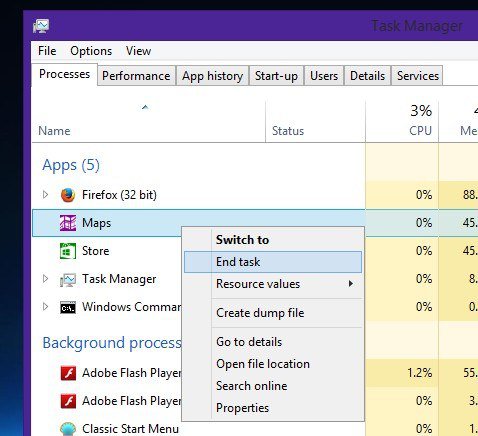As the title suggests, in Windows 8.1, Modern UI app processes continue to run after I've closed the actual apps. I don't know if this behavior is intentional or not, nor do I know of any way to prevent it. I know in Windows 8.0, just about all apps stopped their processes after you close them. So why the persistence now in Windows 8.1? Caching/speed improvement? Is this unique to my system or is there a setting that can stop this behavior? I'd test part of this myself, except I don't currently have access to my other systems at home.
System details:
Windows 8.1 x64 fully updated via Windows Update
All apps fully updated from Windows 8.1 store
As always, any help is greatly appreciated.
System details:
Windows 8.1 x64 fully updated via Windows Update
All apps fully updated from Windows 8.1 store
As always, any help is greatly appreciated.
My Computer
System One
-
- OS
- Windows 8.1 Pro x64
- Computer type
- PC/Desktop
- System Manufacturer/Model
- Custom
- CPU
- Intel Core i7-2600K @ 4.2 GHz
- Motherboard
- Asus P8P67 Rev. 3.1
- Memory
- 16 GB PC12800 Corsair Vengeance @1600 MHz
- Graphics Card(s)
- Gigabyte Windforce 3 Nvidia GTX 770 4 gb
- Sound Card
- Creative Sound Blaster X-Fi Titanium HD
- Monitor(s) Displays
- Vizio VO370M
- Screen Resolution
- 1920 x 1080
- Hard Drives
- 128 gb Plextor PX-128M3 6 Gbps
2 TB WD Black 7200 rpm 6 Gbps
1 TB WD Black 7200 rpm 3 Gbps
750 GB Seagate Barracuda 7200 rpm 3 Gbps
- PSU
- Seasonic Platinum 860w
- Case
- Thermaltake Urban S71 full tower
- Cooling
- 1-Noctua NF-A14ULN, 1-NF S12A PWM, 2-NF-P12 PWM, 2 200mm Thermaltake
- Keyboard
- Logitech K400r w/ integrated touchpad
- Browser
- Firefox, Chrome
- Antivirus
- Norton Internet Security 2014




